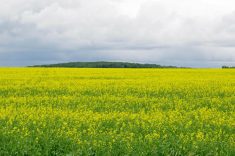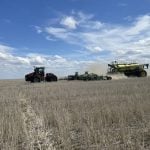If a recently announced bill passes, Peak of the Market’s quasi-monopoly over Manitoba potatoes and root veggies will come to an end — and it seems no one will be sad to see it go.
“As Peak of the Market growers we are unanimous in this decision,” said Peter Loewen, a vegetable grower and chair of Peak of the Market.
“This all sounds fabulous. Let’s get it done,” said Phil Veldhuis, president of Direct Farm Manitoba.
On March 3, the province announced it had tabled a bill to scrap regulations surrounding Peak of the Market and to transition the 80-year-old agency to an independent operation.
Read Also

Air, land and sea join forces as Manitoba launches Arctic trade corridor plans
Manitoba wants to take its Arctic trade routes to the big leagues. The Port of Churchill, CentrePort Canada and Winnipeg airport have all raised their hands to help it happen.
Why? The regulations were holding them back, Peak of the Market CEO Pamela Kolochuk told the Manitoba Co-operator.
Fighting with tied hands
New legislation notwithstanding, Peak of the Market has substantial control over potato and root vegetable production in Manitoba through the Manitoba Vegetable Producers Marketing Plan Regulation.
Growing potatoes and root crops requires a quota from Peak of the Market, and crops had to be marketed through Peak (as it’s often called). This meant meeting Peak’s quality requirements, also set out in regulation.
If a grower didn’t want to grow for Peak, he or she could grow no more than five acres of potatoes and no more than one acre of root crops like carrots and onions.
When these regulations were put into place decades ago, Kolochuk said, the intention was to standardize product being sold to retailers and to ensure food quality and safety.
Loewen told the Co-operator that organizing under Peak of the Market allowed farmers to get better prices instead of competing against each other at the same grocers.
But the landscape has changed since then, Loewen said. Peak’s grower base has substantially decreased over the years — now sitting at 13 farms, according to its website.
“Part of it’s been due to legislation not allowing things to change and I think, as the rest of society has changed, we as farmers have had to adapt,” Loewen said.
Quotas have limited expansion, he said. Some quota markets were full and others were not. New growers had to meet the system’s regulations — which didn’t always work for them.
It seemed easier to deregulate instead of building new regulations, Loewen said.
The rules also kept Peak of the Market from expanding outside Manitoba as much as it liked. Kolochuk said the regulations don’t allow Peak to own assets outside Manitoba — its Calgary distribution centre is leased.
“It creates inefficiencies for us,” Kolochuk said, adding it required them to pack everything in Winnipeg.
“Everyone else can do whatever they want and we couldn’t, right?” she said. “It’s hard to compete at that level when your hands are tied behind your back and your competitor isn’t.”
Stepping on farmers
While Peak may have been hobbled by its own regulations, it was also putting a ceiling on some smaller growers — producers who often use specialized methods to grow higher-end crops.
Jeff Veenstra, who farms with his family near Birds Hill Provincial Park, said he’s been right up against the acreage limits for a couple of years.
“We’re doing OK with that,” he said.
“Knowing that I kind of topped out, like that’s my max that I could do, kind of was discouraging,” he said. “I know that we need to continue to grow but I would never have the ability to produce at the level that Peak of the Market kind of requires.”
Veenstra farms without synthetic fertilizers, pesticides, herbicides, etc. Things like weed control are done manually. To expand enough to meet a Peak quota wouldn’t be possible without going conventional, Veenstra said.
Inability to expand further meant not pursuing restaurants and other customers he knew wanted potatoes like his, Veenstra said. The restaurants he does sell to buy the balance of what they need from B.C., he added, so it’s not like he’s directly competing with Peak.
While acreage limits haven’t been the biggest limitation on small vegetable growers, said Veldhuis, it’s put a cap on a few farms that he knew of.
“No matter how good or how efficient you were, you had this artificial cap on your production,” he said. “Then you go to your local grocery story and you see P.E.I. organic potatoes and you know that the organization that isn’t allowing you to produce more potatoes has bought those and delivered those to the grocery store.”
In 2009, an Otterburne-area farmer told media Peak had warned him not to sell potatoes anywhere — not even from a roadside stand — after it learned he was selling spuds to Sobeys, a Winnipeg Free Press report says.
At the time, then CEO Larry McIntosh told the Co-operator Peak was generally ignoring small-scale marketers even though technically they were operating outside the law.
Exemption rules for small growers came into place in early 2011.
In 2015 two Portage la Prairie growers told the Co-operator that Peak had forced them to throw out thousands of dollars in onions and carrots because they didn’t meet specifications.
One of the growers said he was forced to turf the onions despite having found a buyer outside of the province. Peak said it had found buyers for him but the farmer didn’t like the price.
Veldhuis recalled Peak of the Market going after farmers’ market sellers asking for “onerous” verifications, making it difficult for growers who were sitting right at the non-quota limits.
They had some difficult meetings, Veldhuis said, but to Peak’s credit it expanded limits enough for farmers’ market sellers to be successful.
Should the legislation pass, of course, growers will be able to grow what they want and sell what they want.
“I’m hoping that people see that this is the way we want to move forward. We don’t want to hold anyone back,” said Kolochuk. “We want to end the era of regulations.”
As for Loewen, he said he and other committed Peak of the Market growers will continue to market together under that name despite freedom to do otherwise.
“We feel as a group that we have a good reputation and we’re known for quality,” he said. “We feel confident that it’s better to stick together.”


















